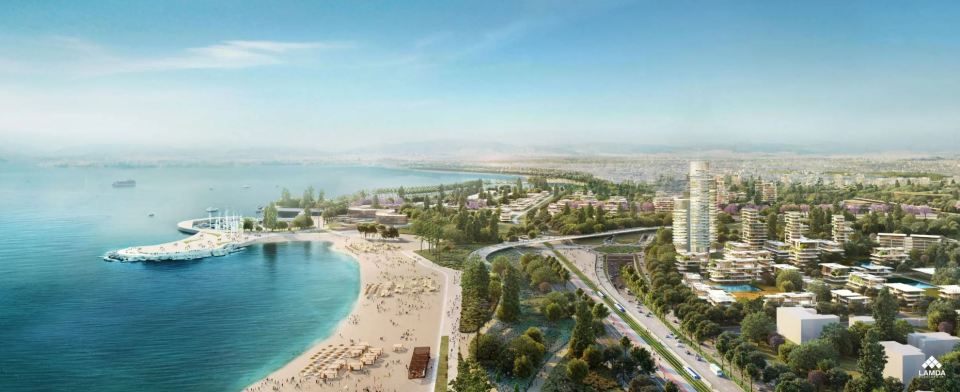INCREDIBLE plans have been revealed to turn a massive abandoned airport thrice the size of Monaco into Europe’s largest “smart city”.
Once filled with rusting jumbo jets and rotting buildings, the Ellinikon International Airport in Athens, Greece, now has ambitious plans to become a sprawling urban metropolis.
theellinikon.comDigital renders of the planned city set to rise on the airport land[/caption]
theellinikon.comThe Riviera Tower will be the first residential skyscraper in Greece[/caption]
theellinikon.comIncredible plans reveal new-age housing colonies[/caption]
Located just a 20-minute drive outside of Athens, Ellinikon will transform both the coastline of Greece as well as the country.
It is being dubbed the first urban regeneration project in Europe -and will be transformed into a “smart” and “green” city.
The masterplan is set to combine residential towers, shopping malls, workplaces and entertainment centres into a sprawling two million-square-meter park.
Residents will be able to access schools, parks, offices, stores and even the beach – all in less than 15 minutes.
To make it a smart city, a one-of-a-kind software will be introduced which will oversee the water supply and waste management systems.
Each of the buildings will be laced with smart energy services.
Odisseas Athanasiou, chief of the developing project, said: “It’s a smart city end-to-end.
“We like to call it ‘Zip Code Paradise.’”
One of the major attractions of the mega-city will be The Riviera Tower – set to be the first residential skyscraper in Greece.
Designed by the renowned architectural office Foster + Partners, the architectural landmark will have 150 homes – each of which will offer stunning views of the city.
For those looking to move to the city, some 243 units have already been put up for sale in one of the neighbourhoods called Little Athens.
Officials expect the city to house some 20,000 people in about 10,000 residencies within the next 13 years.
However, by the end of this summer, at least seven new condo buildings will be visible from the coast, alongside the skyscraper in progress, Bloomberg reports.
Developers have ramped up the project and by next year they are aiming to build as many as 15 new residential colonies, alongside a sports centre with soccer fields, tennis courts and swimming pools.
History of Ellinikon International Airport
By TOM MALLEY
Ellinikon International Airport once served around 11 million passengers a year – and recorded 13.5 million passengers during its final year of operation.
Located four miles south of central Athens, the airport was initially built in 1938, just before the Second World War, at a time when the area was sparsely populated.
But shortly after it opened, the Third Reich invaded Greece and after 1941, the airport served as a Luftwaffe airbase during the occupation.
In 1945, the Greek authorities had to sign an agreement with the United States Air Force that allowed them to use the airport for flights between Italy and the Middle East.
From October 1, 1945, to 1969, the airport became the Hellinikon Air Base.
A command and control centre, as well as a passenger and cargo terminal, were opened at the airport.
In 1958, the airport changed its name to Athens International Airport when its purpose was changed to civil aviation.
In 1988, however, Greece refused to renew their agreement with the US Air Force, which conducted its last operation at the airport in 1991.
Following its official closure ten years later, abandoned planes, empty hangars, overgrown runways and crumbling infrastructure formed part of the huge eyesore that was once a major international airport.
“By Christmas of 2026, we want residents to be living in their houses,” Athanasiou said in an interview.
The 600-acre park will revive the airport area which stood empty for almost two decades.
The restorative landscape will feature a playground and a cultural centre, with 31,000 trees and more than 3million plants native to Greece covering the park grounds.
Some of Ellinikon airport’s history will be preserved as the 1960s terminal hall will stand untouched along with the massive runway light poles.
Meanwhile, more than 300,000 square feet of concrete and tarmac will be transformed into benches and paving.
Michael Grove, landscape architect for Sasaki, the Boston-based firm responsible for the project’s design, told CNN: “We’re using what we have on site through all this beautiful concrete – these 30-centimeter-thick, concrete slabs with marble aggregate the size of golf balls.”
He added that the site will have plenty to offer for everyone from sculpture parks, sport centres, open-air theatres to cycling lanes stretching 18 miles.
“This is a generational and transformational project for Greece,” Grove said.
The designer wants people to enjoy the scenery and engage with the nature as they stroll along the 30-mile walking paths.
He envisions the park to become the Athens’ version of Central Park in New York – a landmark that will stand the test of time and transform the way Athenians use public space.
“Looking at the history of Athens, we’re expecting this park, in some form or another, to be around for 1,000 years,” Grove said.
The idea for the project was born long before the airport went out of operation, but the economic turmoil delayed it over and over.
It has finally been awarded to real estate firm, Lamda Development which estimated it would cost a whopping £6.4billion to realise.
theellinikon.comA Digital render of one of the many shopping centres[/caption]
theellinikon.comA one-of-a-kind software will be introduced which will oversee the water supply and waste management system across the city[/caption]
For almost 20 years, the Ellinikon International Airport was left to rot
The Ellinikon International Airport in Athens, Greece, was closed in 2001
The airport served 11 million passengers a year up until its closure
An internal view of the airport where one of the escalators is blocked up

